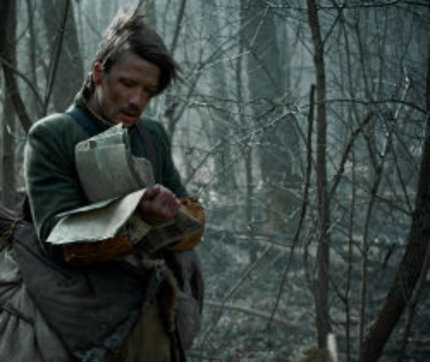TIFF Review: SAUNA

Let us start with this. If I see a better flat out horror film than AJ Annila's wonderfully twisted Sauna in 2008, I'll eat my shirt. This film is a major growth from his ambitious, yet fatally flawed 2006 genre fusion urban drama and wuxia epic, Jade Warrior. Where that film was rigid and strained, this one soars into the dark places of the minds of men effortlessly flowing to its soon-to-be iconic conclusion. It is fitting that Finland is half way between America and Japan, because Sauna takes the stylings and tropes of best of American Art-Horror and J-Horror and froths them together into something that is mesmerizing and uniquely Scandinavian. The result, a period film which is impossible to actually identify the period, lies somewhere in the neighborhood of Edgar Allen Poe and the opening credits for Lars Von Trier's The Kingdom. Those enthusiastic for Fabrice Du Welz's Calvaire (an film that polarized viewers as much as I expect Sauna will) or John Frankenheimer's Seconds are going to be in a state of bliss while this film unleashes its own brand of existential quagmire.
The story is set in the late 16th Century and follows the two Spore brothers, a soldier and a cartographer, charged with marking the border and mapping the terrain between Sweden and Russia after a 25 year war (Over the then fracturing Christian church, but I am no expert). The opening credits and imagery not so subtly suggest that these borders are indeed rivers formed from blood. Blood that will not ever be washed away. Blood that is beyond forgiveness or redemption. This is not an old testament eye-for-an-eye suggestion, but rather older, more pagan notion of morality. Erik, the elder, is a career warrior who has fought all is life, and it is immediately clear, has no way of adjusting to peace. His way of dealing with his own demons and struggles is violence first, questions never. His spectacles give him the veneer of sophistication and civility, Spore is a borderline psychopath, a monster for his times. His younger brother Knut avoided the war in scholarship. Knut far more sensitive, justifiably nervous of his brothers harsh methods, and out of his element in the northern no-man's land forests. That his compass breaks early in the film is one of many symbols that even the ostensibly 'good' natured character in the film is compromised in this unhealthy setting. This is further hilighted in the opening moments of the film, where in a small village where at the good graces of the local peasants. Upon seeing an artifact that he does not approve of, Erik fires off in a rage, killing their farmer host. In an attempt to save the farmers young, blonde-locked daughter from Erik (and admittedly his own) lust, Knut locks her in the root cellar. Upon leaving the village shortly thereafter, the girl is not released from the cellar. The guilt from this action polarizes the brothers and sets the stage for the tell-tale heart tensions between the brothers.
Complicating things is the Russian party that they join up with to set mile-markers up to the norther river. An early scene has the Russian commander wax philosophical on the consequences of the war in terms of filth (this is actually a proposed English title for the film) as, "the mark of where two things have touched." In this case, it is ostensible civilization intruding in the empty northern lands, pagan beliefs colliding with christian conquering, and a history of war between Kingdoms. The uneasy party comes up to the last obstacle before the river, a desolate swamp that curiously has a village in the center. While arguing who the village actually belongs to, both the Russians and Fins are drawn to the centerpiece of the village, the titular Sauna. A haunting and grim place, that in the old lore was said to wash all of ones sins away. Births, marriages, and corpses were bathed in this dark room which itself is a clean white square in the middle of a stark treed wetlands. It offers the mystical promise that forgiveness can be achieved as easily as waters over flesh, instead of the more rigorous process of mending hurts in the place where they were actually caused. As Lady MacBeth knows, and because this is a horror pictures, things are not so easily done, some sins are impossible to forgive (even for Orthodox or Lutherian Christians). The events in the village boil to a conclusion that should satisfy anyone with a lust for the true horror of the unknown and uncanny. Hardcore gore-hounds who love the quick thrills of the usual films in the genre may be baffled by Sauna's brooding pace, set almost entirely in daylight (and aren't the best horror films the one that bring their hauntings out into the light?). But those who like a meditative journey through the dark corners of the soul (with a side order of icky poetic nihilism) will find a lot to love here. Sauna deserves a place on the pedestal alongside Solyaris, Insomnia, The Wickerman and Ringu.







